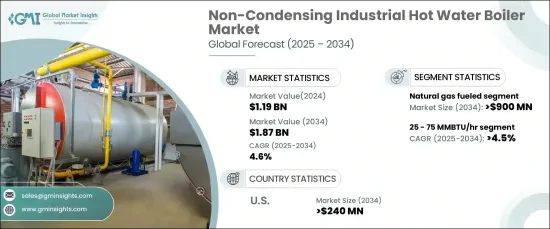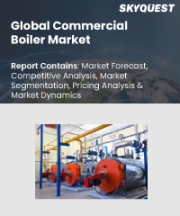
|
시장보고서
상품코드
1665382
비응축식 산업용 온수 보일러 시장 기회, 성장 촉진요인, 산업 동향 분석, 예측(2025-2034년)Non-Condensing Industrial Hot Water Boiler Market Opportunity, Growth Drivers, Industry Trend Analysis, and Forecast 2025 - 2034 |
||||||
세계의 비응축식 산업용 온수 보일러 시장은 2024년에 11억 9,000만 달러에 달하며, 2025-2034년에 CAGR 4.6%로 성장할 것으로 예측됩니다. 급속한 도시화와 산업 성장, 탄소 배출량 감축을 위한 환경 규제 강화가 이러한 시스템에 대한 수요를 촉진하고 있습니다. 재료 개선, 연소 시스템 강화, 제어 메커니즘의 스마트화 등 보일러의 기술 발전이 시장 성장에 중요한 역할을 할 것으로 예상됩니다. 각국 정부도 지속가능한 성장을 추진하고 있으며, 에너지 효율이 높은 솔루션이 더욱 선호되고 있습니다.

비응축식 산업용 온수 보일러는 대규모 난방용으로 설계되었으며, 배기가스에서 잠열을 회수하지 않고 물을 가열하는 방식으로 작동합니다. 이러한 시스템에 대한 수요는 전 세계에서 재생 에너지로의 전환과 다양한 산업 분야에서 효율적인 시스템에 대한 요구가 증가함에 따라 증가하고 있습니다. 에너지 효율과 환경 지속가능성에 초점을 맞춘 정부 정책이 증가함에 따라 비응축식 산업용 온수 보일러 시장은 크게 성장할 가능성이 높습니다. 비응축식 산업용 온수 보일러는 운영 비용을 절감하고 에너지 효율을 향상시킬 수 있으며, 에너지 소비와 배출을 줄이려는 기업에게 선호되는 선택이 되고 있습니다.
| 시장 범위 | |
|---|---|
| 시작연도 | 2024년 |
| 예측연도 | 2025-2034년 |
| 시작 금액 | 11억 9,000만 달러 |
| 예상 금액 | 18억 7,000만 달러 |
| CAGR | 4.6% |
이 시장의 천연가스 발전 부문은 2034년까지 9억 달러 이상에 달할 것으로 예상됩니다. 에너지 가격 상승과 환경 규제 강화로 인해 이러한 보일러에 대한 수요가 증가할 것입니다. 천연가스 보일러는 에너지 효율과 운영 비용 절감으로 인해 산업용 사용자들에게 매우 매력적입니다. 천연가스 보일러의 보급과 재생 에너지에 대한 노력은 그 수요를 더욱 증가시키고 있습니다.
25-75MMBTU/hr 용량의 비응축식 산업용 온수 보일러 시장은 2034년까지 4.5% 이상의 CAGR을 보일 것으로 예상됩니다. 신흥 국가에서는 산업 인프라의 성장과 보일러 기술의 발전으로 인해 이러한 시스템의 채택이 증가하고 있습니다. 이러한 시스템은 대용량 난방 수요를 처리하는 데 적합하며, 대용량으로 작동이 용이합니다. 에너지 비용의 상승과 배출 규제 강화로 인해 산업계는 보다 효율적이고 저배출 난방 시스템을 채택하여 비응축 보일러에 대한 수요가 증가하고 있습니다.
미국의 비응축식 산업용 온수 보일러 시장은 2034년까지 2억 4,000만 달러 이상에 달할 것으로 예상됩니다. 이러한 시스템의 확장성과 중복성을 통해 기업은 변동하는 온수 수요를 효율적으로 관리하고 운영의 안정성을 보장할 수 있습니다. 또한 실시간 모니터링 및 원격 관리를 가능하게 하는 첨단 제어 시스템의 통합은 추가적인 성장 기회를 창출하고 있습니다. 에너지 효율 개선과 탄소 배출량 감소를 위한 세제 혜택 및 보조금과 같은 정부 인센티브는 향후에도 이 시장의 성장을 가속할 것으로 보입니다.
목차
제1장 조사 방법과 조사 범위
- 시장 범위와 정의
- 시장 추정·예측 파라미터
- 예측 계산
- 데이터 소스
- 1차 데이터
- 2차 데이터
- 유료
- 공적
제2장 개요
제3장 산업 인사이트
- 에코시스템 분석
- 규제 상황
- 산업에 대한 영향요인
- 촉진요인
- 산업의 잠재적 리스크·과제
- 성장 가능성 분석
- Porter의 산업 분석
- 공급 기업의 교섭력
- 바이어의 교섭력
- 신규 진출업체의 위협
- 대체품의 위협
- PESTEL 분석
제4장 경쟁 구도
- 서론
- 전략적 전망
- 혁신과 지속가능성 전망
제5장 시장 규모·예측 : 연료별, 2021-2034년
- 주요 동향
- 천연가스
- 석유
- 석탄
- 기타
제6장 시장 규모·예측 : 용량별, 2021-2034년
- 주요 동향
- 10 MMBTU/시 이하
- 10-25 MMBTU/시
- 25-50 MMBTU/시
- 50-75 MMBTU/시
- 75 MMBTU/시 이상
제7장 시장 규모·예측 : 용도별, 2021-2034년
- 주요 동향
- 식품 가공
- 펄프 및 제지
- 화학
- 정제
- 일차 금속
- 기타
제8장 시장 규모·예측 : 지역별, 2021-2034년
- 주요 동향
- 북미
- 미국
- 캐나다
- 멕시코
- 유럽
- 영국
- 프랑스
- 독일
- 이탈리아
- 러시아
- 스페인
- 아시아태평양
- 중국
- 호주
- 인도
- 일본
- 한국
- 중동 및 아프리카
- 사우디아라비아
- 아랍에미리트
- 터키
- 남아프리카공화국
- 이집트
- 라틴아메리카
- 브라질
- 아르헨티나
제9장 기업 개요
- ALFA LAVAL
- Ariston Holding
- Babcock &Wilcox
- Babcock Wanson
- Bosch Industriekessel
- Clayton Industries
- Cleaver-Brooks
- Cochran
- Forbes Marshall
- Miura America
- Rentech Boiler Systems
- Stiebel Eltron
- Thermax Limited
- Thermodyne Boilers
- Viessmann
The Global Non-Condensing Industrial Hot Water Boiler Market reached USD 1.19 billion in 2024 and is projected to grow at a CAGR of 4.6% from 2025 to 2034. Rapid urbanization, coupled with industrial growth, alongside increasing environmental regulations to reduce carbon emissions, is driving the demand for these systems. Technological advancements in boilers, such as improved materials, enhanced combustion systems, and smarter control mechanisms, are expected to play a key role in the market's growth. Governments are also promoting sustainable growth, making energy-efficient solutions more desirable, which boosts the adoption of industrial hot water boilers.

Non-condensing industrial hot water boilers are designed for large-scale heating applications, operating by heating water without recovering latent heat from exhaust gases. The demand for these systems is growing due to a global shift toward renewable energy sources and the rising need for efficient systems in various industries. With increased government policies focusing on energy efficiency and environmental sustainability, the market for non-condensing industrial hot water boilers is likely to see significant expansion. Their ability to reduce operational costs and improve energy efficiency makes them a preferred choice for businesses aiming to cut energy consumption and emissions.
| Market Scope | |
|---|---|
| Start Year | 2024 |
| Forecast Year | 2025-2034 |
| Start Value | $1.19 Billion |
| Forecast Value | $1.87 Billion |
| CAGR | 4.6% |
The natural gas-powered segment of this market is anticipated to surpass USD 900 million by 2034. Due to escalating energy prices and tightening environmental regulations, the demand for these boilers is set to rise. Natural gas boilers offer energy efficiency and reduced operational costs, making them highly appealing to industrial users. Their widespread availability and alignment with renewable energy initiatives further bolster their demand.
The market for non-condensing industrial hot water boilers in the 25-75 MMBTU/hr capacity range is expected to exhibit a CAGR of over 4.5% until 2034. Emerging economies are increasingly adopting these systems due to growing industrial infrastructure and advancements in boiler technology. These systems are well-suited to handle large heating demand, offering high capacity and ease of operation. Rising energy costs and stricter emission laws are pushing industries to adopt more efficient and low-emission heating systems, increasing demand for non-condensing boilers.
The U.S. market for non-condensing industrial hot water boilers is projected to exceed USD 240 million by 2034. The scalability and redundancy of these systems allow businesses to efficiently manage variable hot water demands, ensuring operational reliability. Furthermore, the integration of advanced control systems, which enable real-time monitoring and remote management, is creating additional growth opportunities. Government incentives such as tax rebates and grants, aimed at improving energy efficiency and reducing carbon footprints, will continue to drive growth in this market.
Table of Contents
Chapter 1 Methodology & Scope
- 1.1 Market scope & definitions
- 1.2 Market estimates & forecast parameters
- 1.3 Forecast calculation
- 1.4 Data sources
- 1.4.1 Primary
- 1.4.2 Secondary
- 1.4.2.1 Paid
- 1.4.2.2 Public
Chapter 2 Executive Summary
- 2.1 Industry synopsis, 2021 - 2034
Chapter 3 Industry Insights
- 3.1 Industry ecosystem analysis
- 3.2 Regulatory landscape
- 3.3 Industry impact forces
- 3.3.1 Growth drivers
- 3.3.2 Industry pitfalls & challenges
- 3.4 Growth potential analysis
- 3.5 Porter's analysis
- 3.5.1 Bargaining power of suppliers
- 3.5.2 Bargaining power of buyers
- 3.5.3 Threat of new entrants
- 3.5.4 Threat of substitutes
- 3.6 PESTEL analysis
Chapter 4 Competitive Landscape, 2024
- 4.1 Introduction
- 4.2 Strategic outlook
- 4.3 Innovation & sustainability landscape
Chapter 5 Market Size and Forecast, By Fuel, 2021 – 2034 (Units, MMBTU/hr & USD Million)
- 5.1 Key trends
- 5.2 Natural gas
- 5.3 Oil
- 5.4 Coal
- 5.5 Others
Chapter 6 Market Size and Forecast, By Capacity, 2021 – 2034 (Units, MMBTU/hr & USD Million)
- 6.1 Key trends
- 6.2 < 10 MMBTU/hr
- 6.3 10 - 25 MMBTU/hr
- 6.4 25 - 50 MMBTU/hr
- 6.5 50 - 75 MMBTU/hr
- 6.6 > 75 MMBTU/hr
Chapter 7 Market Size and Forecast, By Application, 2021 – 2034 (Units, MMBTU/hr & USD Million)
- 7.1 Key trends
- 7.2 Food processing
- 7.3 Pulp & paper
- 7.4 Chemical
- 7.5 Refinery
- 7.6 Primary metal
- 7.7 Others
Chapter 8 Market Size and Forecast, By Region, 2021 – 2034 (Units, MMBTU/hr & USD Million)
- 8.1 Key trends
- 8.2 North America
- 8.2.1 U.S.
- 8.2.2 Canada
- 8.2.3 Mexico
- 8.3 Europe
- 8.3.1 UK
- 8.3.2 France
- 8.3.3 Germany
- 8.3.4 Italy
- 8.3.5 Russia
- 8.3.6 Spain
- 8.4 Asia Pacific
- 8.4.1 China
- 8.4.2 Australia
- 8.4.3 India
- 8.4.4 Japan
- 8.4.5 South Korea
- 8.5 Middle East & Africa
- 8.5.1 Saudi Arabia
- 8.5.2 UAE
- 8.5.3 Turkey
- 8.5.4 South Africa
- 8.5.5 Egypt
- 8.6 Latin America
- 8.6.1 Brazil
- 8.6.2 Argentina
Chapter 9 Company Profiles
- 9.1 ALFA LAVAL
- 9.2 Ariston Holding
- 9.3 Babcock & Wilcox
- 9.4 Babcock Wanson
- 9.5 Bosch Industriekessel
- 9.6 Clayton Industries
- 9.7 Cleaver-Brooks
- 9.8 Cochran
- 9.9 Forbes Marshall
- 9.10 Miura America
- 9.11 Rentech Boiler Systems
- 9.12 Stiebel Eltron
- 9.13 Thermax Limited
- 9.14 Thermodyne Boilers
- 9.15 Viessmann




















